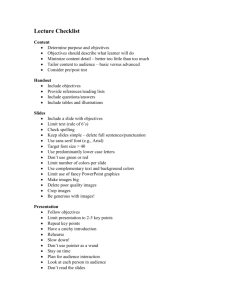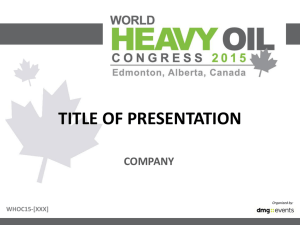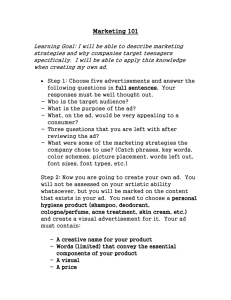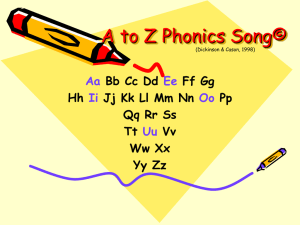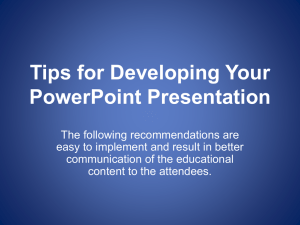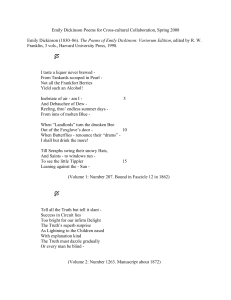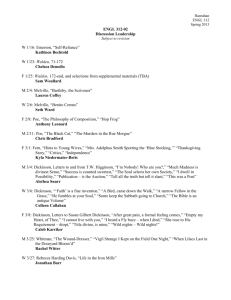Another easy framework to use in developing the body is an
advertisement
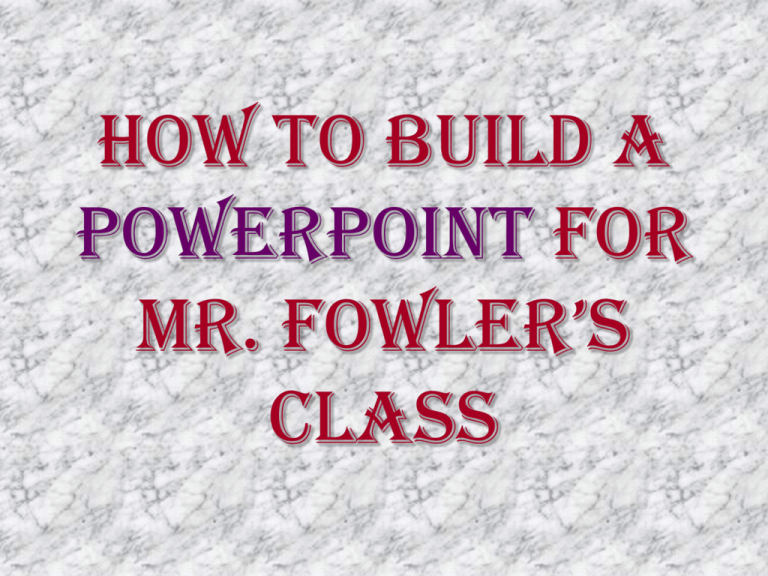
How To Build a PowerPoint for Mr. Fowler’s Class Overview Thoughts The purpose of the PowerPoint is to communicate, not prove you can create cool effects. Use standardized position, colors and styles Include only necessary information Use colors that contrast Be consistent with effects, transitions and animation should be smooth and not just for effect. Plan carefully Do your research Know your audience Time your presentation Practice your presentation Speak comfortably and clearly Develop the body first Every presentation has three essential components: an opening, a body, and a closing. Since the body is the longest part of the presentation, developing it first will save time to create an opening and a closing that tie together. Select a framework to help you develop the body of your presentation. A framework is simply an organizational tool. Some frameworks for organization include: A personal story Three main points Comparison and contrast Past present and future (in any order.) Another easy framework to use in developing the body is an acronym. For example I use the TOAD acronym when explaining what makes "presentations croak. " The "TOAD" acronym stands for, Timing, Organization, Audience, and Delivery. The TOAD acronym is the body of the speech with three minutes devoted to each topic. Make yourself cue cards. Don’t put them on the screen. Put them in your hand. Now, you can use the cue cards you made to make sure you’re saying what you came to say. Make slides that reinforce your words, not repeat them. Talking about pollution in Houston? Instead of giving four bullet points of EPA data, why not read me the stats but show me a photo of a bunch of dead birds, some smog and even a diseased lung? It works. Tips for Making Effective PowerPoint Presentations Use the slide master feature to create a consistent and simple design template. It is fine to vary the content presentation (i.e. bulleted list, 2-column text, text & image), but be consistent with other elements such as font, colors, and background. Overuse of special effects such as animation and sounds may make your presentation "cutesy" and negatively impact your credibility. Use good quality images that reinforce and complement your message. Simplify and limit the number of words on each screen. Use key phrases and include only essential information. Limit punctuation and avoid putting words in all capital letters. Empty space on the slides enhance readability. Use contrasting colors for text and background. Dark text on a light background is best. Patterned backgrounds reduce text readability. Avoid using of flashy transitions such as text fly-ins. These features may seem impressive at first, but are slow, distracting and get old quickly. Make sure your slides are readable from the back row seats. Text and graphics should be large enough to read, but not so large as to appear "loud.“ Practice moving forward AND backward within your presentation. Audiences often ask to see the previous screen again. Practice with someone who has never seen your presentation. Ask them for honest feedback about colors, content, and any effects or graphics you've included. Do not read from your slides. The content of your slides is for the audience, not for the presenter. Do not speak to your slides. Poor presenters face the direction of their presentation rather than their audience. Do not apologize for anything in your presentation. If you believe something will be hard to read or understand, don't use it. Text guidelines Generally no more than 6 words a line Generally no more than 6 lines a slide Avoid long sentences Larger font indicates more important information Text guidelines Font size generally ranges from 24 to 48 point Be sure text contrasts with background Fancy fonts can be hard to read CAPITAL letters are hard to read Avoid abbreviations Limit punctuation marks Clip Art and Graphics Balance the slide Enhance the text, not overwhelm it Do not put text over pictures. Place text on one side and graphics on the other The next slide is an example. Put a Title Here Put text here Use a Font that is easy to read Make sure the font is large enough to read. This is Bookman Old Style 28 point Font. The final slides are samples from unsuccessful student presentations – What is wrong with these slides? Quote about Author According to a source on the Internet, “Here lie the ashes of Dorothy Parker (1893 1967) humorist, writer, critic. Defender of human and civil rights. For her epitaph she suggested, 'Excuse my dust'. This memorial garden is dedicated to her noble spirit which celebrated the oneness of humankind and to the bonds of everlasting friendship between black and Jewish people. Dedicated by the National Association for the Advancement of Colored People. October 28, 1988.” This slide is poorly constructed, the font and background colors do not contrast rendering the page almost impossible to read. Dickinson's father introduced her to a young man from his law office named Benjamin Franklin Newton. Newton had joined the law office in 1847 when Dickinson was away at school. He was a frequent visitor to the Dickinson house, Emily and Benjamin began spending a great deal of time together. They took long walks, admired the natural surroundings discussing and debating literature. Dickinson even consented to show Benjamin some of her poetry. Benjamin was impressed by Dickinson's work, but told her she would have to work extremely hard to become great. This encouraged her and she came to think of Newton as a tutor of sorts. He recommended authors to her and she read nearly every book he suggested. In 1849, Benjamin Newton told Dickinson that he had decided to move back to Worcester, Massachusetts, the town in which he grew up. Dickinson was devastated by his departure. As a parting gift, Benjamin gave her a copy of Ralph Waldo Emerson's Poems Benjamin Newton (Emily Dickinson's inspirer) This slide has far too much text. While the visual isn’t problematic, there is too much text for one page. There is enough text for four or more pages. "Hope is a thing with feathers That perches in the soul; And sings the tune without words And never stops at all." -Emily Dickinson (1830-1886) Student name removed Period 5 The quality of the photograph on this slide is poor and when projected it degrades further. The color of the font does not have enough contrast to the background. The End
